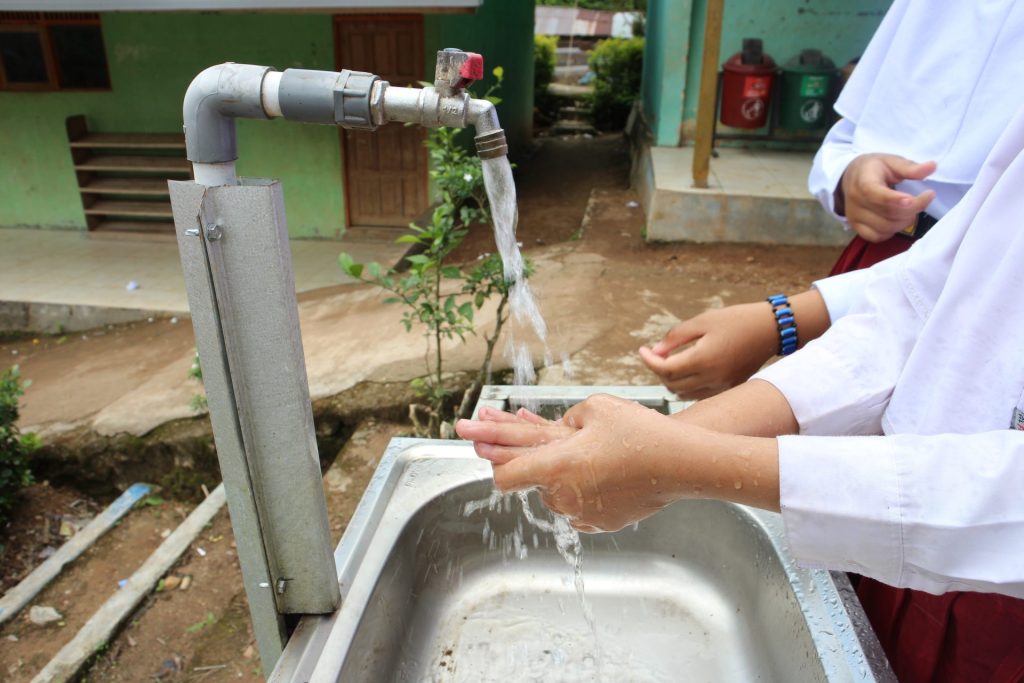- SIWI – Leading expert in water governance
- /
- Latest
- /
- Introducing resilient water, sanitation and hygiene to emergency planning in Honduras
Introducing resilient water, sanitation and hygiene to emergency planning in Honduras
In collaboration with SIWI, the UNICEF country office in Honduras is supporting the education sector to assess the challenges and proposed actions to better respond to climate change related emergencies for water, sanitation, and hygiene, particularly in school settings.

In the month of May this year, UNICEF Honduras and SIWI led the organisation of a Risk Informed WASH BAT, the WASH bottleneck Analysis Tool workshop. A total of 34 participants attended the workshop from different areas of the sector with 18 participants representing the Ministry of Education, through the Department of Education and Environmental Communication and Health. They were accompanied by representatives from the General Directorate of School Buildings and Real Estate, National Council for Potable Water and Sanitation, Secretary of Health, Secretary of Finance, Ministry of Environment, members of NGOs such as Pure Water for the Word and GOAL, among other actors.
Success of the framework
So far, WASH BATs have been implemented in over 100 workshops in 55+ African, Asian and Latin American countries, and this was the first Risk-informed WASH BAT implemented in Honduras. It also had a very specific ambition on preparing schools to better respond to climate emergencies.
The WASH BAT Exercise had a double focus, the first was for participants to understand the enabling environment and process of WASH BAT implementation in the sector in general, and the second focus was to understand and solve the different challenges regarding the implementation of the ‘Integrated Methodological Manual for Risk Management in the Education Sector’, the tool that the government must link schools with the emergency response plan at national level.
This collaboration also represents an opportunity to assess and address the climate vulnerability of Honduras, and how its position affects the provision of WASH services.
Climate vulnerability and WASH in schools in Honduras
According to the Global Climate Risk Index, Honduras is one of the 3 countries (along with Puerto Rico and Myanmar) that have been most affected by climate change in the last 20 years. This calls for WASH services to be climate change resilient in times of adversity and beyond. Extreme weather events such as hurricanes Eta and Iota, which in November 2020 affected more than 9.9 million people, have shown the shortcomings in the governance of the WASH sector. The impacts of these extreme weather events have aggravated the gap between those who do not have services and those who do. The already precarious infrastructure that provides WASH services to the most vulnerable populations, who are usually the most affected, has suffered the greatest damage. To date, the region lacks necessary repairs, pushing its vulnerable population into a situation of further uncertainty of when quality services would be available once again.
According to the latest report of the WHO / UNICEF Joint Monitoring Program for schools, in 2019, 68% of schools in Honduras had a basic water service for consumption, defined as an improved source with available water. About 10% of schools had limited drinking water service (no water available at the time of the survey), and one in five (22%) schools lacked drinking water service. For rural schools, the coverage of basic water services is higher than the national average, 74% compared to 68% nationally. Regarding sanitation, 82% of schools had a basic sanitation service, defined as an improved facility separated by sex. As for data on access to water, there is not enough data to be able to estimate service levels in urban areas. The data for rural schools is much lower than the national average, finding that 11% of schools lacked sanitation services, that is, either they did not have improved facilities, or they did not have any facilities at all. In addition, two out of three schools (66%) had improved facilities that were either not broken down by gender or were not working at the time of the survey.
The plan forward
As a result of two and a half days of intense work, a series of consensuses were achieved, embodied in what is called as ‘priority pillars’ to improve the performance of the sector to achieve objectives 1 and 2 of Sustainable Development Goal 6 in schools in Honduras.
The pillars are as follows:
i) Strengthen the capacities of the sector
ii) Increase financing of the sector
iii) Establish the political framework for sustainability
iv) Strengthen accountability and transparency
The priorities are intended to be a quality input, of participatory origin and the product of the dialogue of the main actors in the sector, for the national, subnational, and municipal emergency plans in development.
Most recent

SIWI Amman and UNICEF host Libya representatives for WASH exposure visit
- Water, Sanitation and Hygiene (WASH)
- Water governance

Water and land: Partners in climate mitigation
- Water in landscapes
- Wetlands
- Water governance

What is the role of water in rural and urban school facilities?
- Water, Sanitation and Hygiene (WASH)
- Water in landscapes
- Water governance
- Gender and water

Taking root: locally driven forest landscape restoration
- Water in landscapes
- Wetlands
- Groundwater
- Resilience through water

SIWI Amman hosts Ghana representatives for WASH exposure visit in Jordan

Join us on a journey through 2023

Peace starts with WASH: 8 steps toward stronger governance

